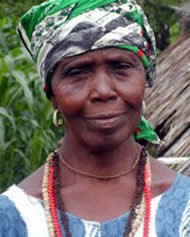Budik in Senegal

Photo Source:
NTM Senegal
|
Send Joshua Project a map of this people group.
|
| People Name: | Budik |
| Country: | Senegal |
| 10/40 Window: | Yes |
| Population: | 6,400 |
| World Population: | 6,400 |
| Primary Language: | Menik |
| Primary Religion: | Ethnic Religions |
| Christian Adherents: | 1.00 % |
| Evangelicals: | 0.30 % |
| Scripture: | New Testament |
| Ministry Resources: | Yes |
| Jesus Film: | No |
| Audio Recordings: | Yes |
| People Cluster: | Mande |
| Affinity Bloc: | Sub-Saharan Peoples |
| Progress Level: |
|
Introduction / History
The Budik people constitute an ethnic group that lives apart from most of Senegalese society.
What Are Their Lives Like?
One seldom meets a Budik in political meetings or other popular gatherings.
Ironically, many Budik join the army. Being accustomed to mountainous environment, they excel at climbing cliffs and walking long distances without getting tired.
Budik girls' unique hair styles are characterized by one big plait on top of the head and several small plaits on the side. Aluminum rings and multicolored pearls adorn the plaits. Their ears are pierced with several holes, and each hole carries a ring of various colors. The nose is also pierced and decorated with a porcupine pin. On each wrist a young lady wears at least five bracelets. The boys also wear distinctive adornment. Once circumcised, each boy begins to wear an earring and a knife at his waist. They claim the knife is not for defense, but as a working tool.
If a Budik boy loves a young girl, he must obtain a kola nut, a calabash, and a handmade cloth two meters long and bring all these things to the girl's family. If the girl and her family are not interested, they will return everything in a couple of hours. However, if the family keeps the presents, this means that the girl loves him, too. The boy now has to prepare a dowry for his future in-laws: $50, one cow, one sheep and one goat. Once accepted by the girl's family, the wedding ceremony will unite the two families and also the two villages. The bridegroom provides enough millet wine to satisfy all who attend. The Bedik people drink millet wine, especially in times of ceremonies like weddings. They also drink bissap, a drink based on sorrel flowers. They put hot pepper in it and drink it without sugar.
After the wedding, the girl's family will go back home and leave their daughter with her husband "for better, for worse".
The Budik people mainly eat food based on millet accompanied by leaves from a baobab tree. They seldom use oil in their food. Rice is prepared when there are visitors. Visitors are always served separately. The Budik people rarely use sugar in their food. They raise poultry, sheep and goats, but they sell them rather than using them for their own consumption.
When hunters return with their game, for example, they give the elder first choice before sharing the game with the others. The Budik people are very respectful to their elders. Birthright is strictly respected. In Budik society, the elders are always given first priority. During village meetings, the men sit by age groups. No young man would be bold enough to sit among the elders.
What Are Their Beliefs?
The Budik people traditionally believe in dialants, a heap of small stones near a wall or tree, where sacrifices are made and prayers are said regularly.
Few Budik are Muslim. When asked why, they reply that the main reason is the dominant presence of Fulbe people in Islam. The Budik and Fulbe peoples do not get along. Fulbe livestock graze on and trample the fields of the Budik farmers. Consequently, most of the Budik people reject Islam and are more open to Christianity.
What Are Their Needs?
The Budik people need clean drinking water. They also need adequate health care facilities.
Prayer Points
Pray for the Lord to show himself powerful among the Budik people by providing them a record crop and healing the sick.
Pray for African Christ followers to take the Lord to Budik leaders and teaching them to disciple others.
Pray for a movement to Christ among the Budik people of Senegal.